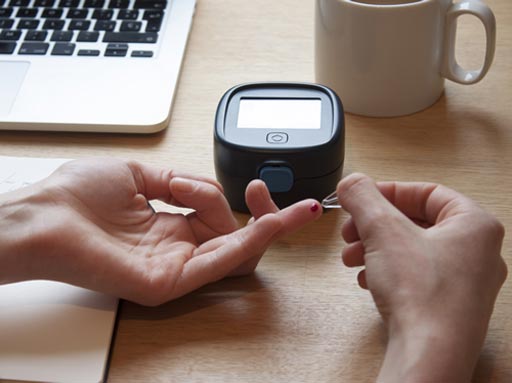Hand-Held Test Kit Developed for Chemotherapy Patients
By LabMedica International staff writers
Posted on 19 Apr 2017
Chemotherapy often reduces blood cell counts, exposing patients to infections, anemia and other problems. Low blood counts, when discovered, are also the major cause of delayed treatment or reduced treatment dosage. The normal procedure has been for a patient to turn up at the hospital and take a blood test before undergoing treatment, but in 20% of cases they were being sent home because their blood counts were too low.Posted on 19 Apr 2017
A hand-held blood testing kit has been developed that can be used at home by chemotherapy patients to tailor treatment to their specific needs. The monitor can reduce cancellations for chemotherapy appointments and limit hospital visits just for blood count checks and that means there are more chemotherapy slots for other people awaiting urgent treatment.

Image: The Affinity monitor takes just a finger prick to carry out a blood test count that helps chemotherapy patients to manage their treatment (Photo courtesy of Entia).
The new system called Affinity was developed in conjunction with scientists from The Royal Marsden Hospital, which is a leading cancer hospital dedicated to cancer diagnosis, treatment, research and education. The system is able to provide an accurate indication before the patients leave home that they are not ready to receive chemotherapy treatment. They can then reschedule and the appointment can be allocated to somebody else. Using Affinity not only ensures that clinical pathways are fashioned around the individual’s needs but it also achieves a significant reduction in healthcare spending.
The Aptus part of the system measures both hemoglobin and hematocrit, detects under filled cuvettes and removes air bubbles, and gives rapid results at the point of care which enables immediate decisions on patient treatment to be made. The system works with capillary, venous or arterial whole blood samples. Aptus can be used by anyone with minimum maintenance required and with a rechargeable battery the system is a fully portable device meaning it can be used anywhere. The reagentless technology means the cuvettes have a long shelf life and do not require special storage. There are likely to be many other applications, and not just in cancer care, because blood counts are so widely used in hospitals and general practices.
Toby Basey-Fisher, PhD, CEO of Entia, said, “The involvement of The Royal Marsden Hospital as one of the world’s leading cancer care centers has been absolutely critical. Having them on board has been a huge benefit. The project allows Entia to validate its miniaturized optical technology through laboratory and user testing and generate cost-effectiveness data to support the case for commercial adoption. It should also prove that an established cloud-based framework can be used to transfer patient data to the clinic’s electronic health records.”














